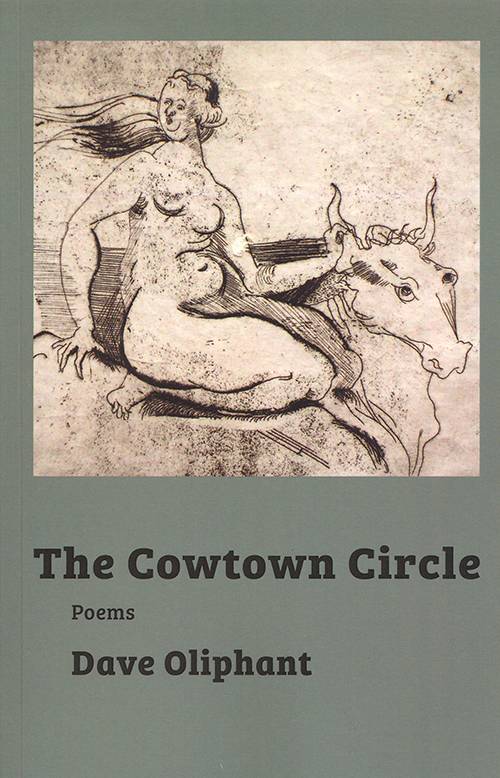Poetic License

The Cowtown Circle
by Dave Oliphant
Austin: Alamo Bay Press, 2014
181 pp. $15.95 paper
Reviewed by
Caitlin McCrory
The Cowtown Circle takes readers on a journey across the physical, linguistic, artistic, and metaphysical landscapes of the imagination. Dave Oliphant’s poems in his latest collection look for truth by meditating on the art of others. Oliphant moves from Stephen Crane to POWs at Camp Hearne to the Americana art of the original cowtown, Ft. Worth. Impressively, Oliphant is able to examine the imprint that everyone else leaves behind in language. The book is a meditative celebration that any poetry lover will enjoy.
Throughout this collection of eclectic work, Oliphant’s lines have a musicality to them, reminiscent of Langston Hughes and Fats Domino. The collection is broken into six sections. The first is “Lone Star Stalag.” Here the choppy brevity of each line captures the feeling of traveling down a water-washed dirt road in a Chevy pick-up with old pump brakes and no power steering.There’s little room for error, yet so much room to glide, if you know how to hold the wheel just right. Oliphant’s poetry is full of speech-sounds, and these give each poem its life into a another’s imagination.The lack of punctuation largely seems a way of avoiding speed humps, so to speak, placed out of fear of not seeing what comes next. Oliphant clears these speed humps, reminding his reader that staying within the lines of tradition does not always inspire the imagination.
My favorite section was the one titled “Maria’s Poems.” The Maria described by the speaker has been diagnosed with cancer. She is losing her memory, and she is unable to bear the weight of it all on her own. But this is not the real subject for the reader. What is carved out as the day-to-day reality in the entire section of “Maria’s Poems” is the real subject—what matters as the determinate meaning is that time does not stop in any reality. All the “delicate things,” “the prayers,” and “the rains,” continue, even after that triggering subject retreats. What makes Oliphant’s work so successful is his uncanny ability to get at what Tim O’Brien calls story-truth—the truth we know in our hearts. This is Oliphant’s thirteenth book of poetry. Thankfully, I don’t think he’ll be slowing down anytime soon.
Caitlin McCrory teaches at Texas State University, where she co-facilitates the Veteran Voices Writing Workshop and works in the Writing Center.
